GIS for Normal People


These days no cell phone is complete without a gps to enable location awareness in applications. The latest crop of web browsers support geolocation in websites through the W3C’s new geolocation API. Thinking to get directions to somewhere you have never been from Google Maps is not an activity limited to geo-nerds.
As location data becomes mainstream, the demand for spatial information from people who are not gis professionals will only grow. It is up to gis-professionals to create the applications to allow the average user to actually use spatial data. At Safe we have recently been focusing on “Maps for the Masses” demos, where we use FME Server to push data into consumer software that almost everyone has installed on their computers such as Google Earth, or Adobe Reader. We have been quite proud of our in-house demos, which stream 3D buildings into Google Earth or create interactive maps for Adobe Reader, but I think everyone’s jaw dropped at our recent User Conference when Wes Hardin and James Katz from Burns & McDonnell gave a presentation on Powering a Spatial Project Dashboard in Google Earth Enterprise with FME. Take some time to watch the presentation below.
The twittering during the session focused on how great their presentation style was, I think they showed a single Powerpoint slide with their names on it, and then did the rest of their presentation entirely in Google Earth. Everyone in the room was amazed at the little touches in their application, such as 3D windfarms that actually moved, and charts overlaid on top of the data, generated in real time through the Google Charts API. As great as these features are, probably the best thing about their Dashboard is the only tool needed to use it is Google Earth. All of the “GIS” is done on an FME Server/Google Earth Enterprise Server back-end.
What they have done is build a relatively powerful tool which can be deployed to workers at project sites and run without any special software. Someone with no gis experience could have a $300 netbook and a tethered 3G cellphone and use this application to access the corporate gis data from anywhere with no software other than an Operating System and Google Earth. It shouldn’t be too long before even gps equipped cell phones are capable of running this. Even in their offices, they said that this dashboard presents non-gis people with such good information, that they can actually save money by reducing helicopter visits to sites!
Burns & McDonnell have certainly taken “maps for the masses” to a whole new level.



